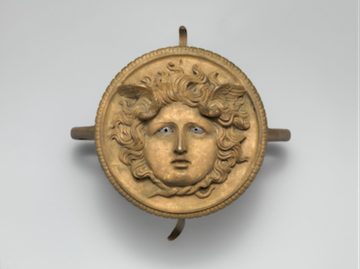Aimee Hinds Scott at the LARB:
 FEW MONSTERS HAVE had as many revamps as Medusa. For many, our first encounter with the gorgon was the fiery stare of Ray Harryhausen’s snake-bodied stop-motion creature, as Harry Hamlin’s Perseus took her head in 1981’s Clash of the Titans. Despite becoming a cultural touchstone for representations of Medusa, Harryhausen’s creation was innovative, a far cry from ancient depictions of Perseus’ prey in presenting a predatory gorgon who attacked back. But Medusa continues to be resurrected in new and varied forms, and the contemporary pop-culture Medusa has herself moved on from her depiction in Clash of the Titans. Shucking her monstrous form, she has been the subject of considerable feminist revision. This feminist vision recasts her as a quite human victim of patriarchy and rape culture. In the most well-known ancient versions of the myth, the mortal Medusa is raped by Poseidon in Athena’s temple, resulting in her punishment by monstrous transformation. This first injustice is then compounded by Perseus’ quest for her head. Following these tales from antiquity, many of which are deeply steeped in misogyny, feminist retellings have rehabilitated the gorgon by bestowing upon her agency expressed through anger.
FEW MONSTERS HAVE had as many revamps as Medusa. For many, our first encounter with the gorgon was the fiery stare of Ray Harryhausen’s snake-bodied stop-motion creature, as Harry Hamlin’s Perseus took her head in 1981’s Clash of the Titans. Despite becoming a cultural touchstone for representations of Medusa, Harryhausen’s creation was innovative, a far cry from ancient depictions of Perseus’ prey in presenting a predatory gorgon who attacked back. But Medusa continues to be resurrected in new and varied forms, and the contemporary pop-culture Medusa has herself moved on from her depiction in Clash of the Titans. Shucking her monstrous form, she has been the subject of considerable feminist revision. This feminist vision recasts her as a quite human victim of patriarchy and rape culture. In the most well-known ancient versions of the myth, the mortal Medusa is raped by Poseidon in Athena’s temple, resulting in her punishment by monstrous transformation. This first injustice is then compounded by Perseus’ quest for her head. Following these tales from antiquity, many of which are deeply steeped in misogyny, feminist retellings have rehabilitated the gorgon by bestowing upon her agency expressed through anger.
more here.
